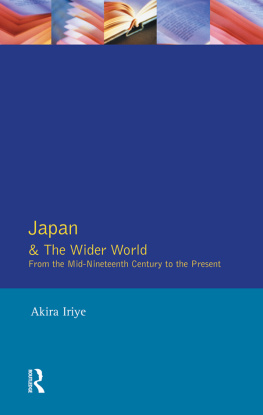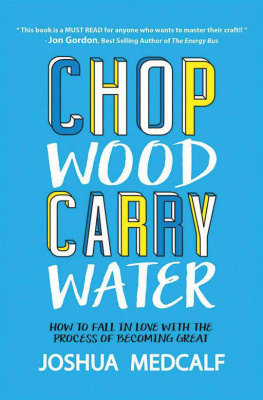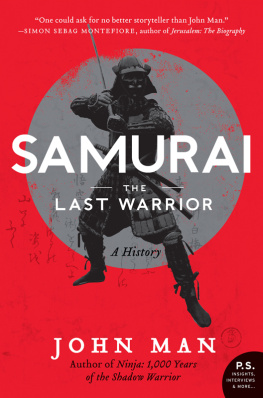Insights on Joshua Medcalf's Chop Wood Carry Water
Insights from Chapter 1
#1
When John was eighteen, he bought a one-way ticket to Japan to become a samurai archer. When he arrived, he was greeted by a friendly old sensei named Akira. He helped John unload his bags and get settled. But the next morning, Akira gathered the newly arrived apprentices and informed them of their first task: for the rest of the morning, they would chop wood and carry water.
Insights from Chapter 2
#1
The Japanese have a deep love of architecture. There was once a man named Kota who built some of the finest houses in Tokyo. He was world famous for his dedication to the process, his willingness to beat on his craft, and his relentless devotion to keep learning. But he grew tired of building homes and wanted to travel.
#2
The story hit home for John and he began to think deeply about his own life. He wondered if he had been building his house wisely.
Insights from Chapter 3
#1
The hardest thing for John to do while he was in the community was to stay focused on the process rather than the outcome. He had to learn to be faithful in the small things, because that is where his strength lies.
Insights from Chapter 4
#1
The process of becoming great is something that must be embraced by the apprentice. If you dont chop wood and carry water, it will take you 20 years to become a samurai archer.
#2
Focus on one solid step at a time when you are climbing a mountain. If you are focused on the top of the mountain, you will not know where to step in front of you.
Insights from Chapter 5
#1
John was constantly proving himself to others, and he was always trying to prove himself to himself. He was never able to shake his old habits, and he continued to see life as a series of tests.
Insights from Chapter 6
#1
Your value is constant and never goes down based on results or performance. Your value comes from who you are, not what you do. You are more than an athlete, parent, brother, or coach.
#2
You cant do anything to make God love you any more or any less. You are free to accept His love, love Him back, love yourself, and finally be free to love others without any restrictions.
Insights from Chapter 7
#1
The apprentices were allowed to watch television once a week. They started to form a bond watching American sports together, and John began to think about the people he admired and write down the characteristics he wanted to be known for.
Insights from Chapter 8
#1
The sensei told the apprentices to stop chopping wood and carrying water an hour early so they could spend some time in the nearby lake. The old witchs niece, who was a witch herself, told the apprentices about the power of discouragement.
#2
The six things you should fuel your heart with are what you watch, what you read, what you listen to, who you surround yourself with, how you talk to yourself, and what you visualize. If you put the wrong fuel into your heart, you will get frustrated and discouraged.
Insights from Chapter 9
#1
Your brain blocks out most of what it is processing. You are only aware of about forty bits of information per second. You and I block out 99. 99999 percent of what our brain is processing. To change the way your brain scans the world, you must write it down.
#2
Johns coach, Akira, encouraged him to keep a what went well journal. It took a lot of discipline, but it was extremely rewarding.
#3
The Growth Mindset is about seeing yourself as a learner and a grower. Anything that happens to you is an opportunity to learn and grow.
Insights from Chapter 10
#1
The secret to success is not talent, but character. While you may have talent, it will fail you if you do not develop your character. Too many people seek exposure from the bright lights, but the bright lights only expose their lack of faithfulness to their craft in the dark.
Insights from Chapter 11
#1
John, the samurai archer, began to feel jealous of his fellow apprentices who seemed to be achieving things faster than him. He began to feel like he should quit, and get a normal job.
Insights from Chapter 12
#1
The difference between talent and skill is widely misunderstood. Many people believe that all you need is talent, and that only the chosen few can ever truly succeed. Many talented people believe this, and then get frustrated when they fail because they think all they need to do is show up.
#2
The rough side of the mountain molds you into a person who can travel far in life. The setbacks of today can become the forging blades of greatness for tomorrow.
Insights from Chapter 13
#1
words are like the wind, they are everywhere. We use them to talk to others, but most importantly, we use them to talk to ourselves. And just like the wind, their power can destroy or create.
Insights from Chapter 14
#1
Mental training is not magic. It is deliberate, intentional, and extremely hard training. It is not easy, and it will not be easy for anyone who wants to become mentally tough.
#2
Mastery is not about constant improvement, but rather about moving in steps. While you might feel discouraged now, youre on a long plateau and in time youll have another growth spurt.
Insights from Chapter 15
#1
John was nervous about his upcoming test. He knew he shouldn't have spoken to his sensei that way, but he was still nervous about what would come next. At 9:59, Akira walked up silently, holding his bow and two arrows.
#2
The final step is to learn to aim with your eyes, your muscles, and your lungs. Everything impacts everything, and you must learn to aim with everything.
Insights from Chapter 16
#1
Forgiving others is like swallowing a deadly drug and hoping the person who wronged you dies from it. Most people want the ninety-foot-tall bamboo tree without the five years of the process. They want the bamboo to grow to ninety feet tall in six weeks, but without the five years of invisible growth, the bamboo wouldnt have a solid foundation.
#2
The price of admission for reaching sustained excellence is the hard work and boring, dirty work of chopping wood and carrying water. You must stay the path and never forget that greatness isnt sexy.
Insights from Chapter 17
#1
The path to mastery is marked with road signs that provide information and instructions. It is marked with warnings about the result of your choices, and it is marked with obstacles. But it is also marked with people who try to hold you back, and circumstances that are out of your control.
#2
John had begun to hit the far target with some consistency, and was excited because the annual apprentice tournament was coming up. But that week, he struggled with a concept he had just learned in training. To play present, you must first learn to live present.
Insights from Chapter 18
#1
The day before the big apprentice tournament, John was on a walk with Akira. How are you feeling about the tournament. Akira asked. Great! I put in my work in the dark, and now its my time to shine under the bright lights. My goal is to win the tournament, and I think I finally have the skill to accomplish that.
Insights from Chapter 19
#1
The ultimate illusion of the human experience is control. The person you want beside you in battle is the one who has surrendered the outcome and surrendered to the fact that he might die. When you surrender the outcome, you are freed up to be at your best.





